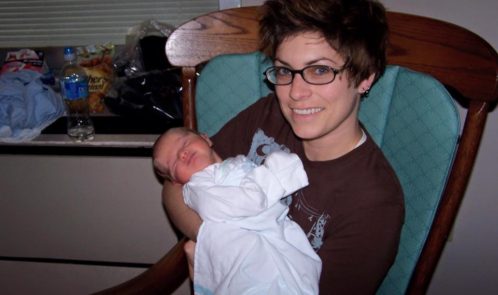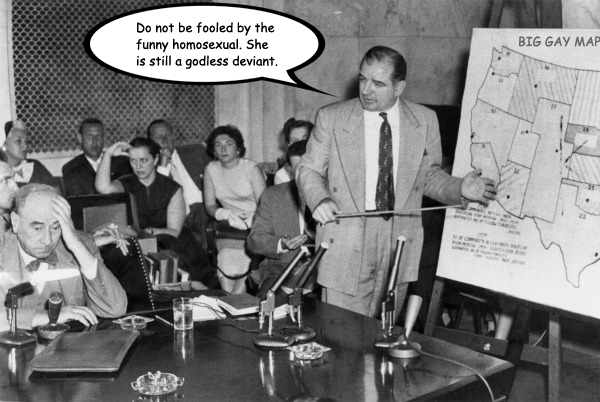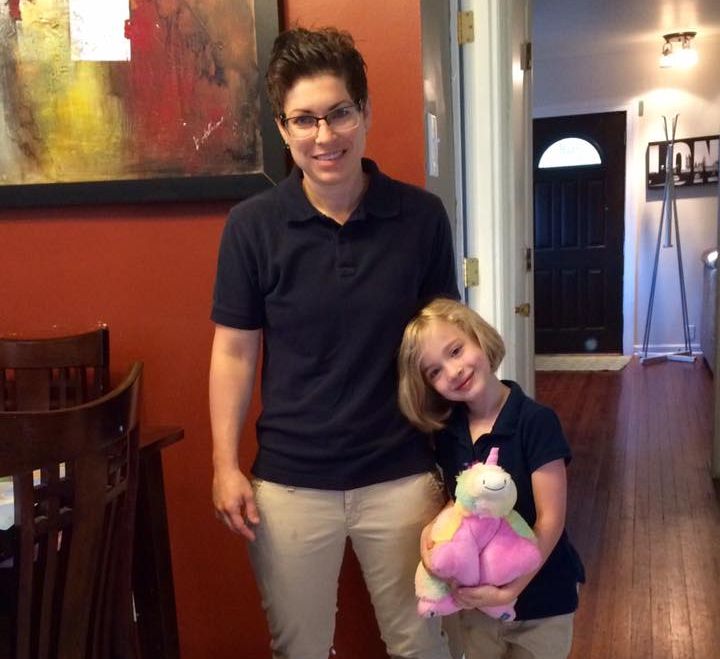I’m a Godless Gay Liar, or The Story of How I Got Caroline

“It doesn’t matter that you’re gay,” the social worker said. “It matters that you are a liar. And if you’ll lie about this, what else will you lie about?”
“It doesn’t matter that you’re gay,” the social worker said. “It matters that you are a liar. And if you’ll lie about this, what else will you lie about?”
Anyone who follows my blog or Facebook page knows I’m a gay woman raising my niece as my own child, that she calls me mommy but knows she didn’t come out of my tummy, and that I have no idea what I’m doing when it comes to parenting, but I know more than I should about how to break into my own house. I’ve watched the topic of gay rights become very popular in my newsfeed over the last year or two, as the laws have finally been catching up with our society’s general views on civil liberties. Obviously the legalization of same-sex marriage last year by SCOTUS was a huge domino to fall, and then just a couple weeks ago it finally became legal in all fifty states for same sex couples to adopt a child jointly. Advocates with the HRC and other equality groups have continued doing the work necessary to topple the remaining dominoes, and there are still several. For instance, only a handful of states explicitly protect the rights of gay people who want to be foster parents, which is essentially what I’ve been doing with my niece for the last five years. Most states do not protect people like me from discrimination in housing or employment. And of course, states like North Carolina and Georgia recently introduced backlash legislation aiming to discriminate under the guise of protecting religious freedom. I looked that one up. Turns out religious freedom was already protected under the first amendment, so I bet they feel pretty ridiculous.
Ridiculous as it is, the pendulum is often difficult to bring to an abrupt stop. Apparently other states are following suit with these religious freedom / gay discrimination bills, my own state of

The story begins in August of 2010, when Caroline was just shy of eleven months old. For reasons I will not at this time disclose, she was removed from her residence and placed in emergency protective custody. This happened in the small town of Russellville, Kentucky, which—with 7000 residents—is the largest municipality in all of Logan County. It is a place out of a Cormac McCarthy novel, firmly rooted in the bible belt, where everyone knows everyone else, and where the high number of churches per capita belies a seedy underside rooted in drug trafficking. I lived about five hours away in St. Louis at the time, and still do. In order to get custody I spent several thousand dollars to hire a local attorney and traveled to Kentucky five times over the course of six months to appear in front of a judge. I won’t go into all of the reasons the process was cumbersome and took entirely too long, but I do want to focus on a few.
Firstly, even though I was a family member—a blood relative—to the child, I had to jump through several hoops because I was out of state. Normally, in-state at least, placement can be made with a suitable family member almost immediately. I kept asking the Logan County social workers involved in the case why I had to wait six months when relative placement often occurs within hours of an incident, and the only answer I ever got was, “that’s just how it is.” I understood there was a certain amount of paperwork that had to slog its way through a bureaucratic machine, but 180 days? Noah loaded the ark with every kind of animal on the planet in just seven, but the social workers did not appreciate this point.

In the meantime I buckled down and began jumping through the hoops in my path. Hoops that, apparently, would not have been required at all had I lived about two hours closer. I was fingerprinted and run through an FBI background check, I submitted a physical exam including an STD check, I stockpiled food and water that would last for weeks, I equipped my apartment with more smoke and carbon monoxide alarms than it already had, I bought a fire extinguisher for the kitchen, I assembled a first aid kit and bought a portable radio and batteries, I posted a list of emergency numbers and an evacuation plan for my apartment (this requirement really made me laugh as you could see both the front and rear door simultaneously from just about anywhere in the place, and I kept imagining a baby trying to read the diagram), I made a nursery room out of my office, I filled out an extensive application and wrote pages and pages of short answer essay questions about myself, I passed a required class, and finally, I had multiple home visits from a local St. Louis social worker who interviewed me. These were all absolute requirements, and as I jumped through each hoop, I couldn’t help but think that a hooker and a meth head with a rabies-infested pet baboon could pop out a baby and take it home without so much as a question. I also couldn’t help but think of my niece, whose personality was in a critical developmental period that needed stability, but who was being shuffled around from person to person, and who celebrated her first birthday and second Christmas with strangers. I was determined to get her.
“I’m not supposed to tell you this,” she leaned in to say quietly…
“I’m not supposed to tell you this,” she leaned in to say quietly…
Somewhere in the middle of all this I had my first home visit from the St. Louis social worker assigned to me, who has since retired, and who shall remain anonymous. For the purposes of this article I shall refer to her as Pamnesia, or Pam for short. Pamnesia was a little old lady with a timid voice, and when I met her she said, “I had the hardest time finding this place.” She proceeded to unpack her bags and spread out her materials on my dining room table. “I’m not supposed to tell you this,” she leaned in to say quietly, “but I have to write everything down because I have a short-term memory disorder.” She then told me about the car accident in her twenties that led to her inability to retain new memories, but somehow allowed her to keep all the memories she had made up to that point. She also said she often forgot the meanings of words. “You have got to be kidding me,” I thought, just nodding my head pleasantly and listening to her tell me again that she shouldn’t really be saying any of this. She walked me through the general process of becoming a foster parent and said she’d be back soon for a follow-up.
When the next follow-up came Pamnesia arrived late, and as I opened the front door she shook her head and said, “I had the hardest time finding this place.” She proceeded to unpack her bags and spread out her materials on my dining room table. “I’m not supposed to tell you this,” she leaned in to say quietly, “but I have to write everything down because I have a short-term memory disorder.” For the next half hour, as she explained to me about her accident, I lived the real-life version of the movie Groundhog Day. “I really shouldn’t be telling you this,” she said again. This happened to me four times. If I’d had to sit with Pamnesia again, I was going to suggest she start tattooing her body with things she wanted to remember, like that guy from Memento.

Now all of this is relevant—very relevant—to my story. See, Pamnesia’s job was to write up a full report on me. But, given her condition, this was difficult for her to do. So she gave me a list of questions, and asked me to write down a paragraph for each one so she could create her report based on my answers. She basically wanted to cheat on her homework, and to be honest, I was just fine with this. In fact, it was ideal. I was also supposed to attend meetings, like a sort of foster-parenting class, but she said if I just studied a binder of information she gave me and answered the questions at the end, like a test, I wouldn’t have to physically appear for the meetings. Once again, although I wondered how Pam retained her job, I was happy to comply.
Some of the questions on the paperwork made me uncomfortable. One question asked me about my religious upbringing, and what my current religious practices included. I didn’t see this as relevant for anyone wanting to take in foster children, much less me taking in a family member. But I answered as honestly as I could by saying that although I did not currently attend any church, I was raised in a Christian household, was baptized, and still held strongly to many of the core teachings of Christianity, such as the Golden Rule. All of that was, and is, true. I wondered what if I was an orthodox Jew or a Muslim or worshipped the flying spaghetti monster or any other thing that’s not exactly mainstream America. Would it matter? Why was this question being asked?
No really though, why was this question being asked?
No really though, why was this question being asked?
There was another multi-part question that directly asked me what my sexual orientation was. I strongly objected, answered the other parts of the question and ignored the part about whether or not I was attracted to men or women. You have to remember, in 2010, “don’t ask don’t tell” was the law of the land, same-sex marriage was illegal in most states, Anderson Cooper was still in the closet, there was no Caitlyn Jenner, and polling numbers showed a majority of Americans had not yet come around to the idea of equal rights. There has been an incredibly fast paradigm shift on the issues related to LBGTQ people, and I feel privileged to be watching it. But way back in the 1990’s, when I first realized I was different from most other girls, I knew immediately to keep it quiet. To tell no one. Because back then, the first thing you learned if you were gay (particularly in rural Kentucky), was to have a sense of shame about it. And that unease I had about telling people—especially in positions of authority—still hung around in 2010. At any rate, I thought the questions were weird and unrelated to my ability to take care of a child in need, who otherwise would be falling through the cracks.
The third time I sat down at my dining room table with Pamnesia, I patiently let her explain that—although she shouldn’t be telling me this—she had a memory disorder. “You’re kidding,” I said, trying my best to act surprised. I presented her with my answers and let her go over them.
“You didn’t answer about your sexuality,” she said.
“I didn’t think it was relevant,” I responded.
“Well, I need to write down something,” she said.
“Can you explain how it’s relevant?” I asked.
“I have to put something. I can’t leave it blank.”
I sighed. “But why?”
Pamnesia thought for a moment. “That’s just how it is,” she said, unable to come up with anything else.
That’s just how it is.
That’s just how it is.
I imagined myself in black and white, sitting across from Senator McCarthy in the 1950’s as he demanded, “Have you now or have you ever been a member of the Communist Party?” I shifted uncomfortably and did the only thing I could think of. I “Bill Clinton’ed” the hell out of the situation. Which is to say, I answered the question without answering the question. I didn’t go so far as to echo his famous statement, “It depends on what the meaning of the word ‘is’ is.” But I equivocated without actually lying. At no point did I say “I am a homosexual” or “I am a heterosexual.” Finally, Pam seemed tired of listening to me dodge the issue, and it was dropped. I thought no more about it until a couple days before the final court hearing in February 2011.

I called the Kentucky social worker in charge of Caroline’s case—who I shall refer to as Dolores Umbridge—to touch base and make sure I had the correct date and time. During the course of this conversation, Dolores intimated that it didn’t matter anyway, that I wouldn’t get my niece, and that they had found out the truth about me. I searched my brain for what in the world they could possibly have found out. Did I have unpaid parking tickets I didn’t know about? Oh my god, had they found out I illegally downloaded Twilight last year? What could it be?
“We know you’re gay,” she said. “And an atheist.”
“What?” I almost choked. I couldn’t believe it. “First of all, I don’t even know where you got that information. Second of all, what does that have to do with anything?”
“We found you online,” she said, smugly self-satisfied. “And we saw pictures of your tattoo.”
Allow me to pause for a moment and explain that I do indeed have a somewhat telling tattoo of a gay robot on my lower leg. I suppose, since the robot sports a rainbow “gay-o-meter” in the middle of its chest which is turned all the way to “gay,” it’s pretty “incriminating.” But here’s where the subterfuge entered.
“It doesn’t matter that you’re gay,” she said. “It matters that you are a liar. And if you’ll lie about this, what else will you lie about?”
“I don’t know what you’re talking about,” I said. “I haven’t lied.”
“We’ll see about that,” she said. “We’ve got the report from your social worker in St. Louis.”
“I’d like to see the report,” I said. “I haven’t seen it so I can’t defend myself.”
“You’ll see it on Thursday,” she replied.

Dolores Umbridge had never liked me. Neither had her colleagues. Neither had the guardian ad litem, who—interestingly enough—was a closeted homosexual. Everyone in the town knew he loved Broadway Musicals a little too much, but, like Michele Bachmann’s husband, he vehemently denied it. And for good reason. Men, especially of his generation, especially in the south, simply did not admit to it, much less act on it publicly. To all these people I was a big-city liberal outsider. They did not like me because I did not reflect their “values.” I didn’t look and act and talk like them. But they didn’t want to say that, so they attacked my character instead. They flipped the script and said I was a liar.
I immediately got off the phone with Dolores and called the Missouri Children’s Division, asked to speak to the supervisor, and demanded the report be faxed to my office. Unsurprisingly, the report in question was a reprint of everything I had written down for Pamnesia. Verbatim. To the letter. Except one noticeable difference—one sentence I had never uttered or written that said simply, “Ms. Osborne describes herself as a heterosexual.” The rest of the report was comprised of my words, not Pam’s.
So Wednesday night, as I had done several times before, I packed up my bags and drove to Kentucky. I slept on a friend’s couch and went to court early in the morning, a general sense of dread hanging over me.
“It doesn’t look good,” my attorney said. “They’ve assembled a whole case against you this thick,” he placed his thumb and forefinger an inch apart. The Logan County Office of Protection and Permanency had latched onto that one sentence. It could have just been ignored. It SHOULD have just been ignored. But they didn’t want to ignore it. They wanted to use it to drag my name through the mud, to attack my character, to call me a liar, and to extrapolate that I must be a bad person with a degenerate moral code who couldn’t take care of my niece because I couldn’t be trusted.
“It doesn’t look good,” my attorney said. “They’ve assembled a whole case against you this thick.”
“It doesn’t look good,” my attorney said. “They’ve assembled a whole case against you this thick.”
Luckily I had made copies of every important piece of paper that came across my desk throughout the process of trying to get custody, including the questions Pamnesia gave me, with the answers in my own handwriting. A simple side-by-side comparison of my hand-written answers with her typed-up report showed I had not lied, that Pam had added that sentence, for whatever reason. My guess is she forgot to get a real answer from me during the interview, then she forgot she forgot until the last minute and added it in thinking it was harmless to do so. Maybe she had second thoughts about adding it, but then she forgot about them. Much as it pained me, I was completely prepared to throw Pamnesia under the bus. There was literally no one else’s story to go on, because Pam didn’t remember nothin’. And she’d tell you that too, although she’d be the first one to say she really shouldn’t.
My heart never beat so hard in my chest as that morning of February 24th, 2011, at the table with my attorney, waiting for the judge to hear our arguments. I glanced over at Dolores Umbridge, across the courtroom, waiting to pounce on me with her report. She looked like just eaten another social worker for breakfast. My attorney had asked for all the other cases to go before us and for all non-essential people to clear the court room because of the sensitive nature of the accusations against me. I waited as multiple copies of the two reports—Dolores’ and Pam’s—were distributed to everyone. The judge read in silence.

Everything in my life for the last six months came down to that moment, but more importantly, the future of a beautiful child did too. These people wielded such power. Obviously, I got Caroline that day. But it was a shock to everyone. It was a shock to me, the social workers, my attorney, pretty much everyone. I got lucky. Although Dolores tried to make her case that she found me to be an unfit placement (not because I was gay, but because I was a liar about being gay), the judge did not listen to it. The judge saw through the tactic. The rest is history, and Caroline has lived with me for five years now. Five of the happiest and hair-pullingest years of my life. I wouldn’t trade it for anything. We go together like peas and carrots.

Today as I write this, Kentucky court clerk Kim Davis still refuses to put her name on marriage licenses in Rowan County, not that far away from where Caroline was born. One of the two major political parties in the United States still refuses to see gay rights as an equality issue. States like North Carolina and Mississippi have succeeded in passing what is basically anti-gay legislation. Supporters of these “religious freedom” laws point their fingers at people like me, calling US the bigots for trying to stop their freedom to deny people services. They’re flipping the script. It’s nothing new. It’s Orwell. “War is peace. Freedom is slavery. Ignorance is strength.” But we’re in the middle of a tide change, and that tide can’t be stopped. Like women’s rights and the rights of black people, the rights of LGBTQ citizens will eventually be completely protected under the law. On paper anyway. Just as racism and sexism still exist, there will still be millions of Americans who don’t think I should be able to get married. Maybe who don’t even think I should raise a child. But I’m out to prove them wrong—well about the raising a kid part, I haven’t found anyone who wants to try marriage with me yet.
As the great Martin Luther King, Jr. said, “the arc of the moral universe is long, but it bends toward justice.” That’s such a perfect quote, but what makes it true is that people don’t stay quiet. They don’t sit down. They ask questions. They challenge the status quo. They don’t accept “that’s just the way it is.” They speak truth to power. That’s why I’m telling my story. Well, that—and I hope Oprah finds it. Mostly I hope Oprah finds it.

